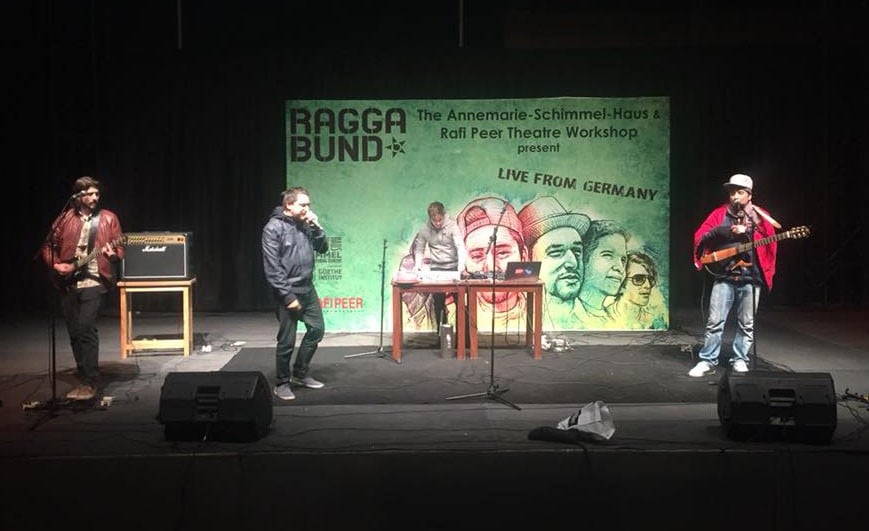
Raggabund held in Lahore, Karachi and Islamabad what were not just concerts but interactive workshops with students

From time to time, bands and music groups have been touring and performing in the cities of Pakistan. Initially, the number was quite large but, with the passage of time and the international situation taking a turn for the worse, the number of such groups started to dwindle. But some missions like the Annemarie Schimmel Haus remained consistent and kept inviting these groups to perform in Pakistan. The latest to display their talent was Raggabund which did so in the three cities -- Lahore, Islamabad and Karachi. In Lahore, they performed at the Rafi Peer Cultural Centre.
The term Raggabund is derived from the German vagabond which means more or less the same in English. The duo comprising Don Caramelo and Paco Mendoza merged their love of reggae and Latin beats with organic sounds, handmade grooves, hip-hop, and electric elements to form Raggabund.
This bringing together of elements-- of dancehall, Latin and reggae -- constitutes the band’s unique sound. They make songs about everyday life, everything that happens round them like the rise of right wing parties, the refugee crisis and the environment, along with party and love songs. The thing that makes them happy, despite all the problems around, has been the basic motivation of their music-making.
In all this, they have been working with two brothers they met in Switzerland -- Herman Milkey Board and Deluca -- who have a band called Dubby Conquerors.
The music group reflected the very contemporary, and had no qualms about not sticking to any one genre and form. Truly eclectic, their every sound-bite, ignored the definition of music where various boundaries are sacrosanct to musicians while taking great pride in the purity of form and intonation.
Ragga can also seem to mean that they were influenced by our music but it can be seen as merely punning; or it may be purely accidental because they had nothing to do with raga music, though they were familiar with it. Actually it is reggae which is closer to their heart.
Raagdari (or raga music as it is known in the West) through experiments in the past fifty odds years, by many including the Beatles, is an introduction and an attempt at fusion with another esoteric musical system. Our raga or raag music is very insular, taking great pride in the purity of its entire approach. The raag has to be sung or played keeping the dos and dont’s very strictly in mind. At the same time the vadi and the samvadi surs too have to be properly integrated into the rendition so that the balance of the mode is not disturbed. The big challenge is to exercise restraint and not be carried away or overtaken by virtuosity in the exposition and exploration, for that can make it lopsided, which can be a musical failing.
In raagdaari music the lyrics or words become totally incidental and subservient to the musical scheme. The musical necessity demands the lyrics to be written and then composed in a certain tonal and metrical system.
But since the rise of popular music in the West, music has become lyric-centered and basically eclectic -- reflecting both the ethnic diversity that was becoming increasingly a factor to be reckoned with and the changing class composition in society there. In the past twenty years or so, technological breakthroughs have facilitated more delving into the nature of sound itself and generated artificial varieties through the computer.
In every concert Raggabund connects with the people. They also have a social message in their lyrics. But they are not a political band. They want to have a good time with the people. The best thing about the group was that they visited schools in Lahore, not exactly having concerts but interactive workshops where students too took part and shared their experiences regarding music.
Since there is hardly any formal education of music in Pakistani schools, most students are either self-taught or just dabble in music on their own, becoming practitioners without learning it as such. For the past couple of decades, most of the learning has been online and many of the practitioners have picked up bits of information and techniques from there without being engaged with formal arrangements like a school or an academy.
When events like Battle of the Bands are held, hundreds of them pour out to perform and one wonders where these groups or sets of musicians have come from. They just seem to pop out of nowhere and occupy centre stage.